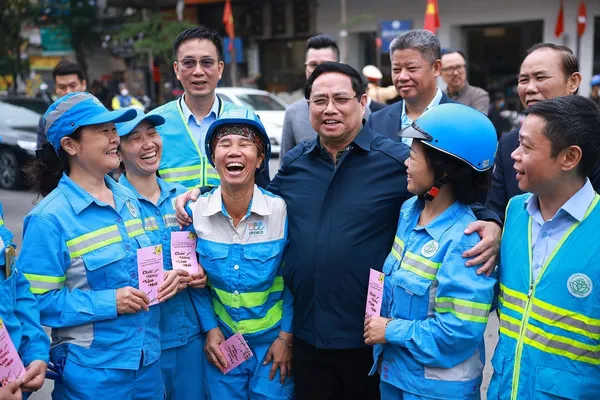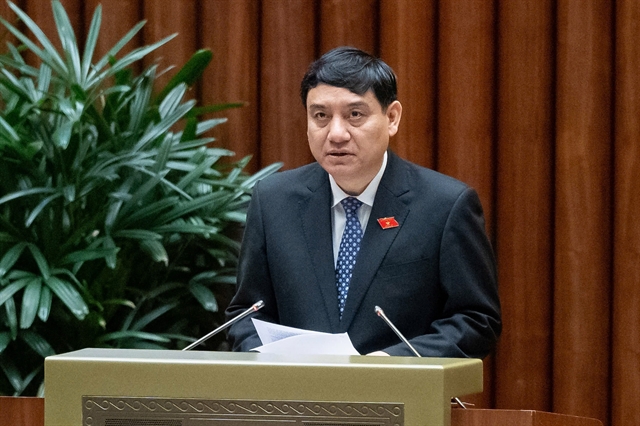 Politics & Law
Politics & Law

 |
| Chairman of the National Assembly's Committee on Culture and Education Nguyễn Đắc Vinh presents the draft Resolution on investment policy for the National Target Programme on Cultural Development for the 2025-2035 period. — VNA/VNS Photo Phương Hoa |
HÀ NỘI — The national target for increasing spending on culture has been approved by the National Assembly, with VNĐ400 billion, US$15.7 million, agreed to help preserve and restore the country's heritage sites.
The Investment policy of the National Target Programme on Cultural Development for the 2025-2035 period was approved by the Assembly on Wednesday morning, with 430 delegates in agreement, accounting for 89.77 per cent of the total number.
Chairman of the NA Committee for Culture and Education Nguyễn Đắc Vinh said that by the end of March this year, the country had 66 cultural centres (63 provinces and cities had cultural centres, of which Hà Nội, HCM City and Hải Phòng have two).
While the country as a whole has 41 museums and 54 provincial libraries.
Thus, many provinces and cities do not have enough of these types of institutions, so setting a target for investment in building these types of institutions by 2030, as in the draft Resolution, is extremely necessary.
The NA Standing Committee believes that the programme’s goal is to protect and promote the value of cultural heritage, including the restoration and embellishment of national relics and special national relics.
Accordingly, degraded relics at risk of destruction will be invested in for restoration and renovation. Other relics can be restored to enhance their usability and value, contributing to the development of tourism and cultural industry.
Currently, many relics are in severe degradation, and there are not enough funds for restoration.
Therefore, the NA Standing Committee recommends that the Government, in the process of developing the Feasibility Study Report and implementing the programme, carefully review current status of relics, carry out restoration and embellishment in the direction of prioritising the ones that are seriously degraded, ensuring effective, key investment, thrift, fighting waste and promoting the relics’ value.
Some deputies argued that Goal No 5, which focused on "implementing digital transformation and applying the achievements of the Fourth Industrial Revolution," was overly broad.
They proposed introducing more specific and detailed guidelines.
In response, the NA Standing Committee revised the goal to: "Strive for 100 per cent of cultural and art units to be computerised, digitally transformed, and integrated with the achievements of the Fourth Industrial Revolution."
Flexible response principles
In terms of funding for the programme, Chairman Vinh said that some deputies believed that many localities were having difficulty in arranging capital from the local budget, suggesting a more flexible counterpart principle to support these localities.
The deputies suggested increasing central support rate and reducing local counterpart rate.
The NA Standing Committee accepted the delegates' opinions.
According to the Law on Public Investment, after the NA approves the programme’s investment policy, the Prime Minister will issue a decision on principles, criteria, allocation norms and counterpart capital ratio of the local budget to implement the programme, which will take into account the local budget balancing capacity.
The NA Standing Committee proposes that while developing the Feasibility Study Report, the Government directs concerned agencies to closely coordinate with localities to determine the appropriate counterpart ratio.
Several deputies expressed concern that the proposed reliance on other capital sources, set at 12.4 per cent, remained high and might be unrealistic for localities facing challenges.
According to the NA Standing Committee, other capital sources include capital from enterprises, organisations and individuals participating in the programme, capital called for through investment attraction policies and voluntary contributions from people.
The rate of 12.4 per cent is the average rate nationwide.
For localities with developed socio-economic conditions, especially localities developing cultural industries, the rate will be higher, for localities with difficult socio-economic conditions, it is possible to ask for people's contributions in the form of working days or goods.
When the programme is effectively implemented, it will bring benefits to the community, attracting contributions from the community and businesses.
Regarding the planned capital allocation and progress, deputies suggest reviewing and evaluating the ability to allocate the budget and disburse capital next year.
The NA Standing Committee said that according to the Investment Policy Proposal Report, the programme planned to allocate capital next year of VNĐ400 billion (US$15.7 million), of which the central budget is VNĐ150 billion ($5.9 million) and the local budget is VNĐ250 billion ($9.8 million) for 63 provinces and cities.
The NA Standing Committee found that this amount of capital is completely within the budget's balancing capacity.
Trade Union Law
At the same session, the NA approved the revised Trade Union Law with 443 delegates in favour, equivalent to 92.48 per cent of the total deputies of the legislature.
The new law, which will take effect from July 1, 2025, comprises six chapters and 37 articles, outlining the functions, duties, rights and responsibilities of the Vietnamese trade unions.
Key provisions of the law include workers’ rights to establish and engage in trade union activities, the rights and responsibilities of trade union members, the responsibilities of the State, organisations, enterprises and employers towards trade unions, and the settlement of potential disputes.
Central to the revised law is the clear delineation of membership criteria, particularly for foreign workers. While foreigners can join local trade unions, they are not allowed to hold leadership positions.
Presenting a verification report of the NA Standing Committee, Chairwoman of the NA Committee for Social Affairs Nguyễn Thúy Anh emphasised that, as trade union is a broad political – social organisation representing workers and labourers and operating under the Party leadership, the law seeks to ensure trade unions are harmonious with the existing legal system, while encouraging workers and enterprises’ engagement and meeting the demand of the international integration and ongoing economic development.
The Vietnam General Confederation of Labour (VGCL) will be responsible for providing detailed guidelines for the implementation of the law.
The new law maintains the rate of trade union fees at two per cent of the salary, together with introducing regulations on managing and using trade union finances. — VNS




